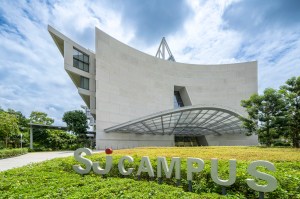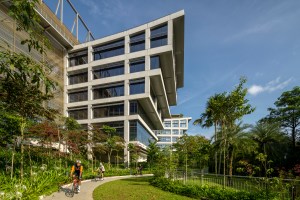Surbana Jurong to spend S$300 million over next three years on strategic acquisitions
The consultancy envisions more than doubling its revenue by 2026, says group CEO Sean Chiao

As reported by The Business Times
SURBANA Jurong (SJ) – an urban, infrastructure and managed services consultancy that’s wholly-owned by Singapore investment company Temasek Holdings – is committing S$300 million over the next three years for strategic acquisitions.
These investments, said SJ’s group chief executive Sean Chiao, will focus on advancing sustainability and energy transition as well as digital innovations including AI-driven solutions to optimise energy usage, reduce waste and improve efficiency within the built environment.
“We are looking for a niche. How can the M&As (mergers and acquisitions) strengthen our market sector capability and strengthen our global footprint?” he said in his first interview with The Business Times since being appointed to the top job in April last year.
“According to our SJ26 plan, we envision (growing) more than double on revenue.”
He added that part of the growth will be organic while the other part will arise from M&As.
Chiao was referring to the consulting firm’s refreshed SJ26 strategic roadmap that charts its growth to 2026. By then, the aim is to achieve a double-digit percentage earnings before interest, taxes, depreciation and amortisation, he said.
“We want to (elevate) SJ (to be) the first-tier design engineering consultant in the world. We are No 1 in Asia, but we want to be top 10 globally,” he said.
The hour-long interview took place at SJ’s new campus, which will celebrate its official opening on Wednesday (Mar 13).
This campus, which is the new global headquarters, is located at CleanTech park in the Jurong Innovation District in western Singapore, near Nanyang Technological University.
Built on a site area of 28,000 square metres, the facility comprises 10 blocks of five to seven storeys each that can house more than 3,000 employees.



Geographical expansion
In the next few years, SJ intends to expand its focus outside of Asia and Australia, said Chiao.
Headquartered in Singapore, the group has 16,000 employees based in more than 120 offices in over 40 countries across four regions: Asia; Australia and New Zealand; the Americas, Europe and Central Asia; and Africa, the Middle East and Pakistan.
Currently, 60 per cent of the group’s revenue comes from Asia, 25 per cent from Australia and 15 per cent from the rest of the world, he noted.
Chiao expects to see a “moderate increase” from 25 per cent to 30 per cent for Australia, and a doubling of the 15 per cent share from the rest of the world to 30 per cent by 2026.
Asked to explain the reasons for such a shift, Chiao pointed to the demand for world-class services that comes on the back of population growth.
“As a global engineering consultancy, we follow market demands,” he said. “So when the economy is growing, when the city is growing, when the population is growing, they need services to help position them in a much more sustainable and innovative position.”
Chiao revealed that SJ’s key markets include Saudi Arabia, major cities in India, the US and the Central Asia region, which he likened to China 20 years ago.
Although many may think doing business in India is not so easy, the group is “very optimistic” about the world’s most populous country, albeit cautiously, he said.
A key project in India is the upcoming Noida International Airport, which is set to be the country’s largest. SJ Group provided design consultancy services as part of its engineering, procurement and construction contract.
When asked if the group will be entering new territories, he replied: “Not very aggressively.”
Noting that he did receive proposals for such requests, particularly in “booming” Central Asia, Chiao said: “We are monitoring some countries, but that doesn’t mean we’re going to grow everywhere.”
The way he sees it, opportunities may abound but not all of them necessarily have to be pursued.
“You need to have a very clear strategy, very clear priorities and very clear focus,” he explained.
SJ currently operates in four Central Asian countries – Georgia, Kazakhstan, Tajikistan and Uzbekistan.
In Georgia, SMEC – part of the SJ group – was appointed in 2017 as a technical adviser for the Batumi bypass road project, providing consultancy services for design review and construction supervision.
Services expansion
Geography aside, Chiao identified four growth sectors: energy, infrastructure, water and environment, and smart city facility management.
“Fundamentally, we believe infrastructure is a critical growth engine worldwide and everybody’s upgrading their infrastructure, particularly in the developing countries,” he explained.
Certain social infrastructures, such as healthcare, will be a focus as well, added Chiao.
On smart city facility management, Chiao highlighted the importance of leveraging digital innovations to manage facilities much more efficiently and for them to be more energy-efficient and environmentally friendly.
To achieve these targets, the group will have to continue strengthening its capabilities, ensure the quality of its work and develop its brand, he added.
“When I say capability, it’s about our leadership and resources. We need to win work and recruit talented people to help us deliver the work, including people outside and inside those countries.”
From Chiao’s perspective, to build a sustainable business model, SJ needs to have solid local ground teams instead of relying on a team that flies in and out of the different countries it operates in.
On whether there are plans to boost headcount, Chiao replied: “Definitely… That’s a very reasonable knowledge that we need to hire, but we are not going to hire according to the previous ratio because we want to be smarter, we want to use technologies, so we want the productivity increase.”
He added that artificial intelligence and digital capabilities are things the group is very keen on.
“(It’s) the same situation – we grow on revenue, on profit, on headcount, but the headcount ratio is probably going to be hopefully the lowest… Use less resources and more digital,” he said.
Big ambitions
Chiao, who grew up in Taiwan, holds a degree in architecture and a Master of Architecture from the University of California, Berkeley, as well as a Master of Architecture in Urban Design from the Graduate School of Design of Harvard University.
After working in the US for some years, Chiao moved to Hong Kong, where he lived from 1995 to 2023, before relocating to Singapore last April.
His last stop before joining SJ was New York-listed infrastructure consulting company Aecom, where he spent 25 years.
As he nears his first anniversary as SJ’s group CEO, Chiao says he feels re-energised.
On why he joined SJ, he said: “I’m excited about the potential… I know this company is going to be a brilliant company in the very near future. People just have not realised it.”


